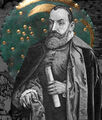Template:Selected anniversaries/May 12: Difference between revisions
No edit summary |
No edit summary |
||
| Line 18: | Line 18: | ||
File:Jacques Binet.jpg|link=Jacques Philippe Marie Binet (nonfiction)|1856: Mathematician, physicist, and astronomer [[Jacques Philippe Marie Binet (nonfiction)|Jacques Philippe Marie Binet]] dies. He made significant contributions to number theory, and the mathematical foundations of matrix algebra. | File:Jacques Binet.jpg|link=Jacques Philippe Marie Binet (nonfiction)|1856: Mathematician, physicist, and astronomer [[Jacques Philippe Marie Binet (nonfiction)|Jacques Philippe Marie Binet]] dies. He made significant contributions to number theory, and the mathematical foundations of matrix algebra. | ||
||Oskar Bolza ( | File:Oskar Bolza.jpg|link=Oskar Bolza (nonfiction)|1857: Mathematician [[Oskar Bolza (nonfiction)|Oskar Bolza]] born. He will be known for his research in the calculus of variations; his work on variations for an integral problem involving inequalities will later became important in control theory. | ||
||Eduard Ritter von Weber (b. May 12, 1870) was a German mathematician. He will work with partial differential equations, in particular the Pfaff problem. Pic. | ||Eduard Ritter von Weber (b. May 12, 1870) was a German mathematician. He will work with partial differential equations, in particular the Pfaff problem. Pic. | ||
Revision as of 07:41, 5 July 2018
1812: Artist, musician, author, and poet Edward Lear born either today or tomorrow.
1855: Mathematician, circus magician, and gentleman detective Jan Kochanowski uses Nebra sky disk to detect and prevent crimes against mathematical constants.
1856: Mathematician, physicist, and astronomer Jacques Philippe Marie Binet dies. He made significant contributions to number theory, and the mathematical foundations of matrix algebra.
1857: Mathematician Oskar Bolza born. He will be known for his research in the calculus of variations; his work on variations for an integral problem involving inequalities will later became important in control theory.
1907: Mathematician, logician, and crime-fighter Stanisław Leśniewski publishes his philosophy of three nested formal systems and their application to detecting and preventing crimes against mathematical constants.
1941: Engineer, inventor, and pioneering computer scientist Konrad Zuse presents the Z3, the world's first working programmable, fully automatic computer, in Berlin.
2014: Painter, sculptor, and set designer H. R. Giger dies. He gained fame for his work on the film Alien.
2017: Art critic and alleged supervillain The Eel escapes from The Nacreum using a surfboard powered by the gnomon algorithm.
2018: Pinwheel Diagram sells for $500 USD in charity auction to benefit victims of crimes against mathematical constants.








